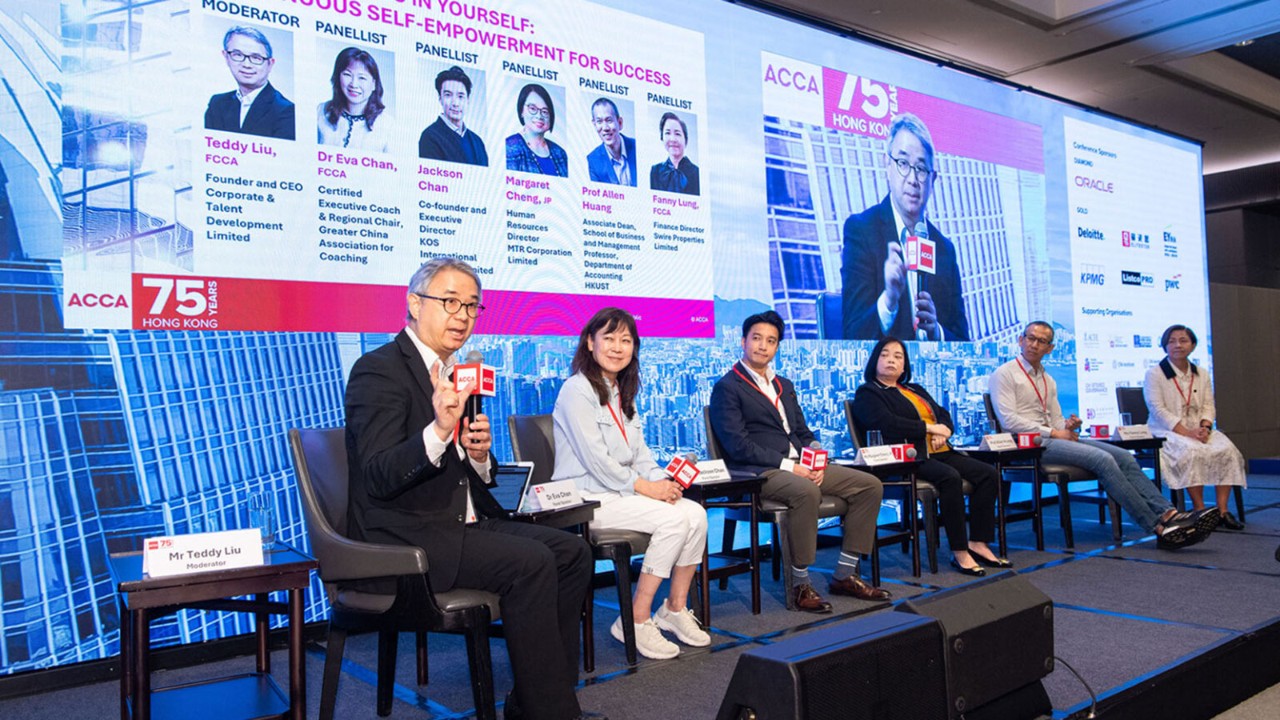
Sustainability initiatives, technological innovation and evolving workforce expectations are redefining what it means to be an accountant today, according to expert speakers at the ACCA Hong Kong Annual Conference 2025.
‘Looking ahead, accountants won’t just crunch numbers – they will take on dynamic roles as strategic advisers, data analysts and promoters of sustainable development,’ said Adrian Chong ACCA, policy manager at ACCA, during his presentation ‘ACCA insights sharing on future accountants.’
Chong highlighted three key drivers shaping the future of financial transformation: sustainability, technology advancement and the growing focus on purpose among younger professionals. The integration of artificial intelligence (AI) in finance has already transformed core functions, such as fraud detection, tax preparation and cashflow analysis, paving the way for a more efficient and tech-driven profession.
At the same time, organisations must address the expectations of new entrants to the field, as younger professionals increasingly seek meaningful work that aligns with their values. While these advancements present exciting opportunities, Chong stressed the importance of adhering to three core principles: value creation, risk management and ethical conduct. These principles, he noted, remain the bedrock of the profession even as accountants evolve to meet the challenges of a rapidly changing business landscape.
‘How do we prepare accountants to be more adaptable, stay ahead and remain relevant?’
Human edge
Professional adaptability and learning agility in the AI era were front and centre during the panel discussion ‘Smart investing in yourself: continuous self-empowerment for success’.
‘We can either be changed or drive changes,’ said moderator Teddy Liu FCCA, founder and CEO of Corporate & Talent Development. ‘The key question is: how do we prepare accountants to be more adaptable, stay ahead and remain relevant?’
Jackson Chan, co-founder and executive director of KOS International Holdings, underscored the hybrid skillset required in modern finance. ‘AI won’t replace all humans, but it will certainly replace those who can’t use it effectively,’ he noted. ‘While AI competency is now a baseline expectation, the differentiating factor lies in relationship building and learning agility.’
‘Recruiters want to see candidates who are genuinely passionate about the role’
Today’s accountants have shifted from traditional bookkeeping to predictive analytics, while auditors tackle environmental, social and governance issues and risk management. Armed with both financial expertise and business acumen, more CFOs are stepping into CEO roles, according to Chan.
In recruitment, Chan advocated the ASK – attitude, skills and knowledge – framework, prioritising attitude above all. ‘Recruiters want to see candidates who are genuinely passionate about the role and eager to drive the business forward,’ he explained.
Soft skills
While AI revolutionises recruitment processes, authentic human qualities still tip the scales in hiring decisions, according to Margaret Cheng JP, human resources director at MTR Corporation.
Cheng noted that AI’s accessibility has levelled the playing field in job application processes. ‘With AI tools being so readily available, almost every cover letter we receive looks polished and similar. What’s important is authenticity and being genuine to yourself,’ she said.
‘What we are looking for are enablers with strong critical-thinking abilities’
For finance positions with major employers, technical competency is merely the starting point. ‘When hiring for accounting and finance positions, we take technical skills as a given. What we are looking for are enablers with strong critical-thinking abilities – professionals who can devise solutions and alert decision-makers to downside risks,’ Cheng explained.
It’s during demanding budget seasons that soft skills, including empathy and emotional intelligence and communication skills, prove their worth. ‘Finance staff need empathy to understand other departments’ needs, challenges and pain points, rather than simply mandating cost cuts,’ said Cheng.
Digital upskilling
Among corporations, Swire Properties is leading the charge in the comprehensive digital upskilling of its finance function. The company has launched a digital transformation initiative in partnership with EY, building on its earlier success with ACCA’s digital certificate programme.
‘Over the next three years, we aim to equip 80% of our finance team – from entry-level staff to top management – with digital skills,’ said Fanny Lung FCCA, finance director at Swire Properties. ‘The programme combines online training, specialised expertise courses and in-person knowledge-sharing workshops.’
‘We encourage finance teams to partner proactively with other departments’

Swire Properties has integrated AI into its daily operations, with smart budgeting models driving productivity and enabling scenario planning. However, Lung stressed that technical capabilities must be matched by strong interpersonal skills: ‘We encourage finance teams to partner proactively with other departments in solving financial challenges.’
Recognising the importance of incentivising innovation and growth, Lung has implemented concrete incentive measures. ‘As employers, we need to consider how to reward and incentivise employees when they create added value. These are concrete steps we can take to support their growth,’ she said.
Rethinking education
In this disruptive environment, educational institutions are recalibrating their approach to preparing finance professionals for the future workplace.
‘Face-to-face communication skills have become more valuable than technical abilities,’ said Professor Allen Huang, associate dean, School of Business and Management and professor and head, department of accounting, at Hong Kong University of Science and Technology (HKUST). ‘We now incorporate presentations, communication exercises and one-on-one Q&A sessions in evaluating students to gauge their true understanding of the subject matter.’
Teaching highly specific technical skills is challenging in a fast-changing environment, according to Huang. ‘We needed specialists in AI prompting two to three years ago, but AI models have advanced so rapidly that this skill is becoming outdated,’ he said.
‘Investors want to build a personal connection to understand company decisions’
In response, HKUST has adopted a more foundational approach to education. ‘Our focus now is on developing students’ core competencies, considering what employers need,’ said Huang. ‘University is where students discover both their career direction and life path.’
Embracing changes
‘While accounting is a logical profession, the world of coaching is much broader – it deals with human nature and emotions,’ said Dr Eva Chan FCCA, certified executive coach and regional chair, Greater China at the Association for Coaching. Unlike traditional consulting, coaching empowers individuals to uncover their own solutions through powerful questioning and active listening.
Drawing from her own journey from accounting to CFO and investor relations roles, Chan stressed the growing importance of interpersonal skills in finance. ‘Investors want to build a personal connection to understand company decisions. They are not looking for someone to simply recite what’s already in the financial report,’ she said.
The traditional command-and-control management style is giving way to a more collaborative approach. ‘Today’s leadership isn’t about just managing staff; it’s about coaching them, giving them the autonomy to complete tasks their way rather than dictating every step,’ Chan said.
She concluded with an encouraging message for finance professionals: ‘If we maintain our curiosity and commitment to learning, we can reach places we never imagined possible. Don’t fear change – embrace it, and you’ll find your way forward.’
More information
Register to access the on-demand ACCA Hong Kong Annual Conference 2025
Read our articles from the conference, ‘Making your mark‘, ‘Investment strategy reset‘, and ‘Strategic shifts for sustainable growth‘

